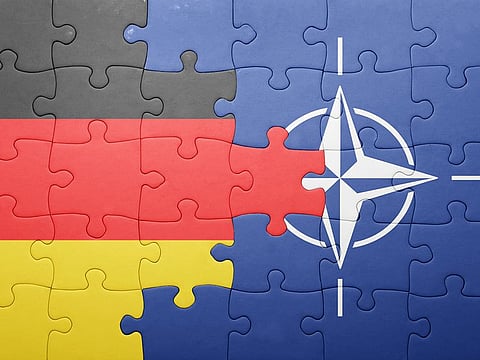Why Germany isn’t turning its back on Nato
Berlin remains deeply committed to hope that all conflicts can be solved through dialogue

Last week was a dismal one for Germany. “Is Germany a Reliable American Ally?” the national-security writer Tom Rogan asked in the Wall Street Journal, answering with a resounding “Nein!”
The New York Times published an article entitled “Where Is Germany in the Ukraine Standoff? Its Allies Wonder,” and the German broadcast service Deutsche Welle pointedly wondered, “Is Germany Letting Its Allies Down?”
If Russian President Vladimir Putin were to spontaneously abandon all his demands of the United States and Nato and withdraw Russian troops from the Ukrainian border, there would still be substantial damage to allies’ trust in German reliability and, as a result, concerns over Nato cohesion.
The main bone of contention is the German government’s decision not to export weapons to Ukraine. Reports that Germany had denied the British Royal Air Force overflight rights for its arms transfers to Ukraine were eventually debunked — the Ministry of Defence confirmed that it had never asked.
Decision-makers in Berlin are probably baffled by the forcefulness of their allies’ reactions. But the government’s position should not be surprising to anyone paying close attention.
The Political Principles of the Federal Government for the Export of Weapons and Other Military Equipment states that the country will not authorise exports of “war weapons” “weapons of war and other military equipment related to weapons of war” to non-members of the European Union or Nato “that are involved in armed conflict or where there is a threat of such conflict (or where “existing tensions and conflicts would be triggered, maintained, or aggravated by the exports”).
Restrictive arms exports policy
In its coalition agreement, the new German government has announced that it wants a “restrictive arms exports policy” that it aims to develop into a common EU policy. In particular, the Green Party — whose former co-leader, Annalena Baerbock, is now in charge of the Foreign Office — has in the past criticised German arms exports as too extensive.
But more important than the legal reasons is the fact that Germany’s leaders, and many ordinary German citizens, believe that their country’s approach is the right one for resolving the Russia-Ukraine conflict — or, at least, for avoiding further escalation.
To put it bluntly: What some commentators abroad see as appeasement, cowardice, and the triumph of economic interests over security concerns, many Germans see as a grown-up, sensible, and conciliatory approach to foreign policy. (A recent poll found that 59 per cent of Germans supported the decision not to send arms to Kyiv.) Germans view themselves as enlightened, having moved beyond power politics, the national interest, and militarism.
Germans have forgotten what military might is for in liberal democracies. The idea of deterrence, or of the military being an element of geopolitical power needed for strong diplomacy is foreign to most German citizens.
Those arguing for increasing the defence budget — for example, to meet the 2-percent-of-GDP threshold expected of Nato members — are often characterised as warmongers. (Germany still falls short of the 2-percent goal, though, it has in fact slowly increased its budget since 2014, when Russia invaded Ukraine.)
In a debate about the Russia-Nato standoff carried by my local German radio station, the dominant view was that de-escalation and diplomacy are what’s needed, with one listener commenting, “I am against weapons in general,” and another warning that nobody should talk about war since, “If you talk about something, it becomes possible.”
Some commentators see Germany’s foreign policy as more than idealistic. They explain Berlin’s position by pointing to the Nord Stream 2 pipeline — slated to link Russia and Germany by circumventing Ukraine — and other German economic interests. Self-interest exists, as does empathy for Putin, but these are not the root cause of the government’s current position.
‘End of history’ narrative
Baerbock, the foreign minister, said that position was “rooted in [German] history.” Germans know what history she is referring to. They read the 20th century, and 1933-1945 in particular, as a lesson in the evils of geopolitics and militarism, and they internalised the post-1989 ‘end of history’ narrative better than anyone else.
After the end of the Cold War, Germany spent decades insulated from the harsh world of power politics; most Germans believed that countries were converging toward a system that marginalised military power and favoured economic power and legal proceedings.
Many decision-makers and voters in Germany remain deeply committed to the hope that all conflicts can be solved through dialogue under international law and international organisations such as the United Nations — as if all conflict resulted from misunderstandings instead of competing interests.
In a 2020 poll, only 24 per cent of Germans said they considered that under some circumstances, war could sometimes be necessary to achieve justice, while over 51 per cent said war is never necessary. In the specific case of Russia, there is also a belief that Berlin might be better-placed than others to play a mediating role. Berlin should remain gesprchsfhig — “able to talk” with Russia.
Germany’s allies might find its habitual pacifism frustrating — but they should still try to understand the underlying mindset. And Germany should do what it can to reassure these allies, even if it maintains its rejection of arms deliveries.
In a speech in the German parliament on Thursday, for instance, Baerbock said military actions against Ukraine would have “massive consequences” for Russia. In the end, despite the restrictions imposed by its laws, there is little doubt that the German government stands behind Nato and its allies.
The new government put a strong message of support for Nato in its coalition agreement. But given the prominence of dovish voices in the country, German leaders need to redouble their efforts.
Washington Post
Ulrike Franke is a senior policy fellow at the European Council on Foreign Relations


